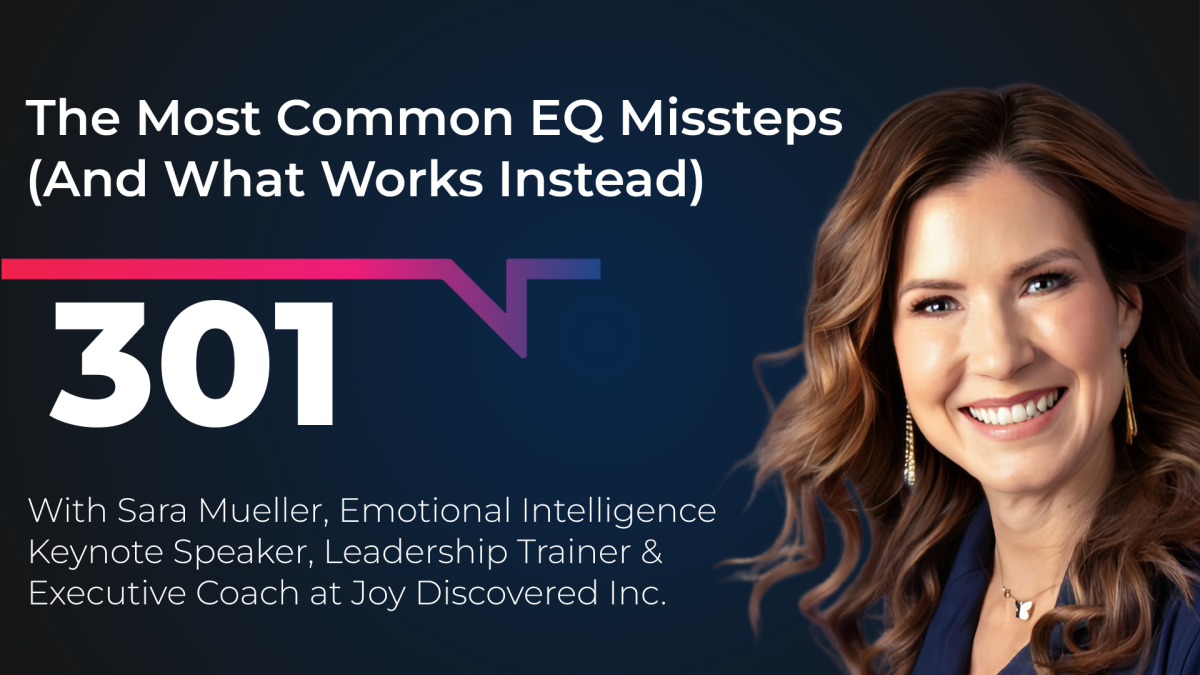The Most Common EQ Missteps

Emotional intelligence (EQ) is often misunderstood, yet it’s one of the most powerful predictors of leadership success—both at work and home.
In my recent conversation on the Unscripted podcast (a show geared toward senior leaders of service-based businesses) we explored the most common EQ missteps leaders make and, more importantly, what actually works.
From self-awareness to relationship management, this episode is packed with practical strategies to help you lead with greater clarity, impact, and connection. If you’re ready to sharpen your EQ and elevate your leadership, tune in now!
Or, skim through the top takeaways we’ve highlighted from the episode below.
“I must say I really enjoyed the podcast. I actually shared it with several members of my team and made my wife listen with me. 👏” ~VP ERP Implementation & Services
Episode Highlights:
[08:45] – Pillar 1: Self-Awareness:
- Self-awareness is the foundation of emotional intelligence and effective leadership. While 95% of people think they’re self-aware, research shows only 10-15% actually are.
- As leaders, our self-awareness often diminishes as we climb higher, making it critical to actively seek feedback from all directions.
- Expanding our emotional vocabulary is equally vital. Most people can name only three emotions when there are 87 to draw from.
[18:41] – Pillar 2: Self-Management:
- While it might not be the flashiest skill, self-management is the foundation for consistent, high performance. It’s about making disciplined choices that align with your long-term goals instead of giving in to instant gratification.
- Often, we know what we should do but don’t follow through because old patterns and thoughts hold us back. The key is catching yourself in those moments, focusing on neutral facts instead of emotional reactions, and creating habits that allow time for what truly matters.
[26:07] – Pillar 3: Empathy and Others’ Awareness:
- Listening to understand is the cornerstone of empathy and emotional intelligence.
- As leaders, the instinct to jump in and solve problems can backfire, leaving teams disempowered and innovation stifled. Instead, pause, ask questions, and create space for your team to express themselves and identify root causes.
- Engaged employees who feel heard are three times more likely to thrive at work.
[30:33] – Pillar 4: Relationship Management:
- The glue that ties all pillars of emotional intelligence together, relationship management focuses on inspiring greatness in others rather than leading through fear or authority.
- It’s about creating a culture of respect, tough love, and honest communication, where conflict is embraced as a pathway to innovation and growth.
- Start by bridging the “delusion gap” in recognition. Regular, specific praise tied to outcomes can be a quick win.
- Additionally, stop avoiding conflict. Instead, adopt a “me and you versus the problem” mindset, equipping your team with tools to navigate challenges collaboratively and constructively.
Quotes From Yours Truly 🙂
“We’re looking at emotions as data. If we’re angry about something, that means that we need to maybe put up a boundary, make a change, or take a stand.”
“We think EQ takes time. We think it takes time to treat our employees well with that recognition. But it’s being proactive because if that employee isn’t getting that level of care, that human-to-human connection that you’re talking about, they’re likely gonna leave.”
“People who have high EQ are 27% more productive than their average EQ counterparts. People who work for a high EQ manager are 50% more inspired, especially in the service industry.”
“Self-awareness is really understanding and knowing yourself. It’s about understanding your values, your strengths, and your weaknesses. It’s about having an accurate perception of yourself as a leader.”
To listen to the full episode, click here!
Lots of love,
Your coach,
💜Sara

🛡 Notification: Process 0,7577828 BTC. Assure => https://graph.org/GET-BITCOIN-TRANSFER-02-23-2?hs=5dd36dc15778ce76f0e68ebb5cb10d85& 🛡 | 19th Mar 25
kaktyw